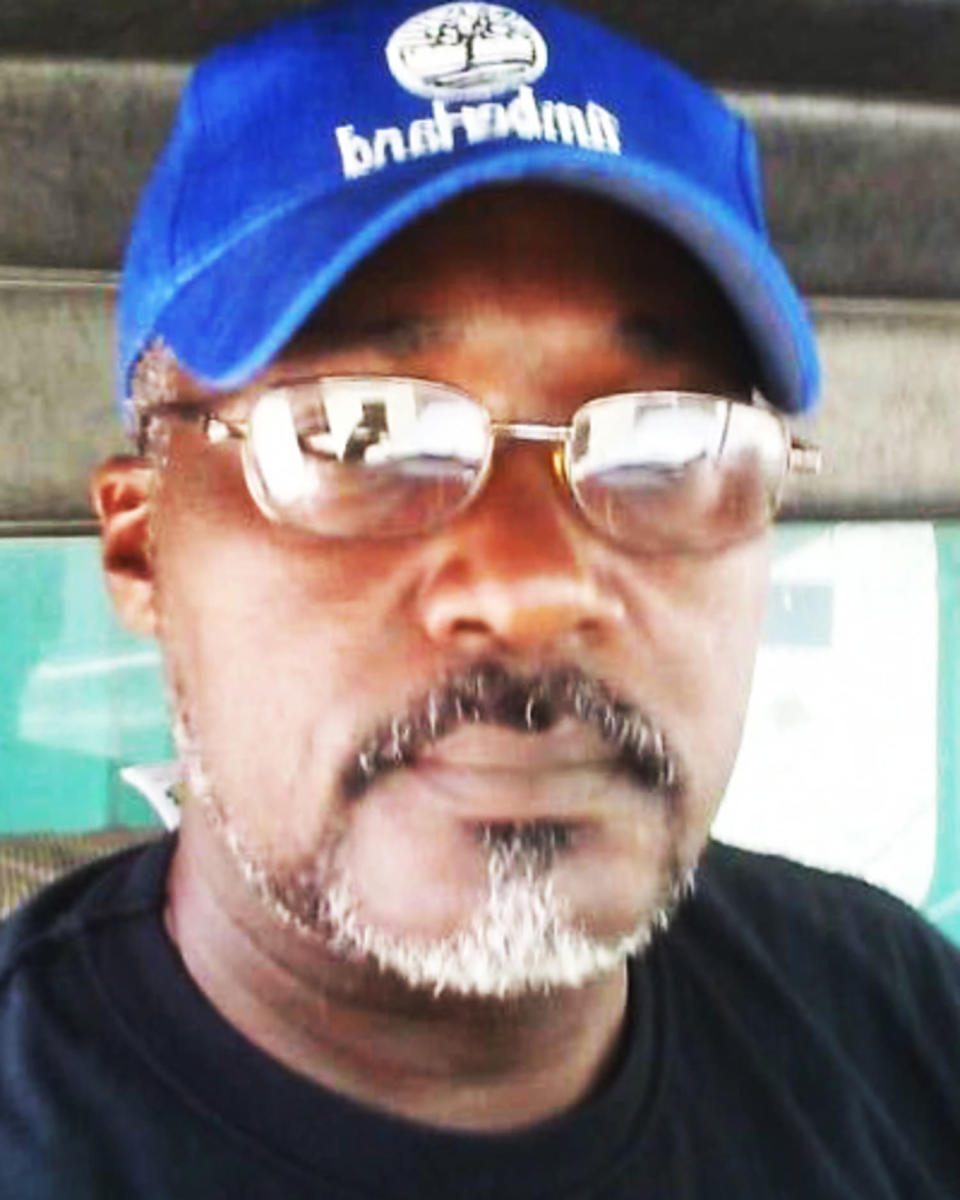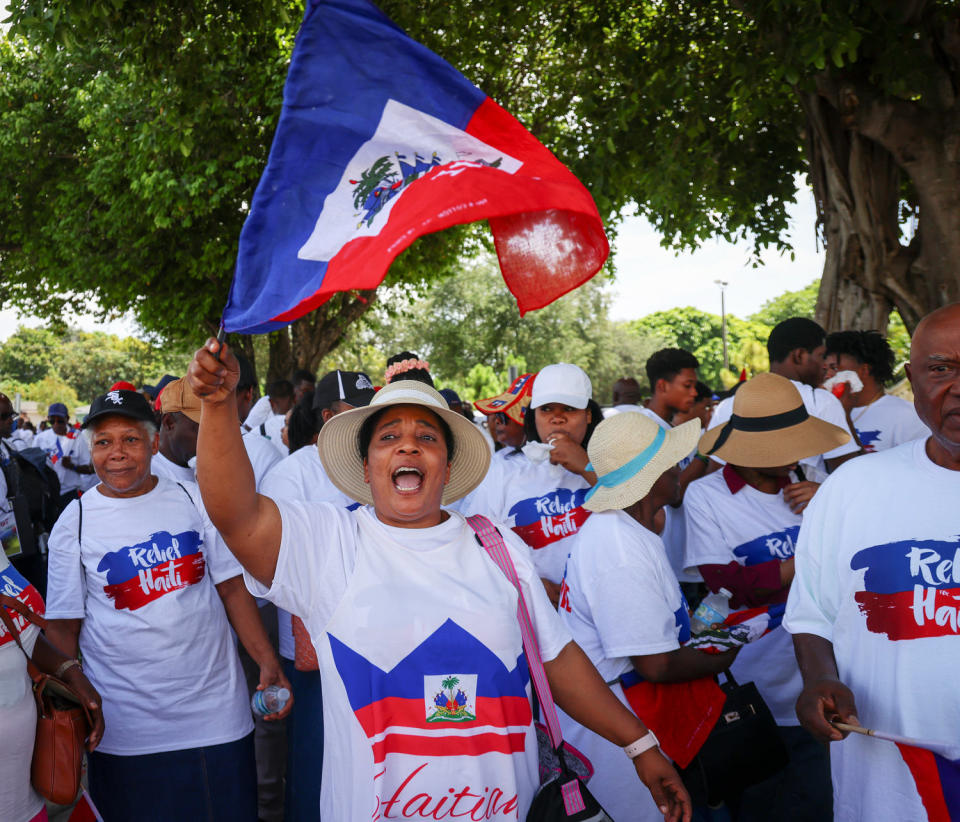Haitian Americans in Florida are desperate to hear from relatives as violence roils their homeland
MIAMI — It has been over two weeks since the family of Steeve Pierre, a Miami resident originally from Haiti, received the dreaded phone call asking for a ransom for the release of his cousin.
Pierre, 40, who came from Haiti in 2019 and owns a landscaping business in Miami, said his cousin, Borgella Antoine, went missing in Haiti at the end of February. Antoine, a truck driver, was delivering goods when he was kidnapped by members of a gang.
“At the beginning, we were trying to do something," Pierre said. "I even sent money to Haiti in an effort to raise enough money to get him released."

But the gang started asking for more money and now wants $500,000. It’s too much for Pierre's family, and the owner of the truck company he works for is now trying to negotiate to lower the ransom.
“It’s very stressful for all the family. Whenever your phone rings you’re afraid to answer because you don’t know what the news will be,” Pierre said. “We’re praying he’s alive and will come home safe.”
Pierre is one of many Haitians living in Miami whose lives have been rattled by the outbreak of violence in the Caribbean nation. Florida is home to the largest community of Haitian Americans in the United States. Many of them, with deep ties to their country and with relatives back home, are grappling with the uncertainty of not knowing what will happen next. Some are gripped with fear when they are unable to reach a loved one by phone.
Anderson Charles, 40, a Miami resident who came from Haiti in 2001, said family members who live in Port-au-Prince, the capital, were forced to go into hiding in the countryside recently.
While they were away from home, armed burglars broke in, stole possessions and eventually realized the family had relatives in the U.S. Charles said the gang members decided to wait for the family to return home, so they could kidnap them and ask for a ransom.
The family was alerted by neighbors and have been hiding since.
“I spoke to my aunt this morning, and she’s scared,” Charles said. “She doesn’t have money and it’s hard for me to send it because, when they go to a bank or Western Union, they are being watched by gang members.”
The current turmoil is not completely new to the Haitian American community here. That population began growing rapidly in the 1970s and 1980s as people escaped political repression and economic hardship during dictatorships. Many settled into neighborhoods like Little Haiti in Miami, where colorful murals decorate the streets and Kreyòl is heard everywhere.
Haiti, with about 11 million people, has been in turmoil since the still-unsolved assassination of President Jovenel Moïse in 2021 led to widespread violence.

The lawlessness in Haiti reached a climax recently after the unelected prime minister, Ariel Henry, traveled to Kenya in late February to secure a deal for a United Nations-backed security mission to support the police. The government declared a state of emergency as Haiti went into a downward spiral of terror and violence. Gangs control much of Port-au-Prince, setting fire to police stations, storming two of the country’s biggest prisons and freeing an estimated 4,000 inmates. U.S. forces evacuated nonessential workers from the U.S. Embassy in Port-au-Prince.
Henry announced Tuesday from Puerto Rico that he would resign once a transitional presidential council is created. Shortly before his announcement, officials of the Caribbean Community (Caricom) announced the creation of a transitional presidential council and met with Haitian political leaders and U.S. Secretary of State Antony Blinken.
One question still looming is whether gangs, which wield much power and have deep ties to the political elite, will allow the new council to take over. Haiti’s most powerful gang leader, former police officer Jimmy “Barbecue” Chérizier, rejected any solution led and supported by the international community. Chérizier emphasized that it’s Haitian people who need to choose who will govern.
Some experts have warned that nothing will change in Haiti unless there is more inclusiveness in the next steps.
“It [the council] is a step in the right direction,” said Chantalle Verna, a history and international relations professor at Florida International University. “However, it does seem to replicate the flaws and limits of past councils or commissions that have been put together.”
“Although reaching consensus will be a difficult process it is essential in order for there to be a positive outcome," said Verna. “We have reached a very dire situation because of the lack of respect for Haitian political opinion and demands from the population.”
Meanwhile Haitians have been left with little access to food and clean water. The U.N.’s World Food Program has said 4 million people face “acute food insecurity” and 1 million are a step away from famine.
The Biden administration committed $33 million in humanitarian aid for Haiti as well as $300 million for a U.N.-backed security force. Kenya said it wouldn’t contribute to the multinational police force until a transitional presidential council was formed.
The Biden administration has allowed a limited number of Haitians into the country under a humanitarian parole program that allows 30,000 asylum-seekers each month from Haiti, Cuba, Venezuela, and Nicaragua combined. Deportations to Haiti have not been suspended, despite the situation there.
Some Florida lawmakers are preparing for a potential influx of Haitian migrants who flee the violence and try to reach the state by sea. Republican Gov. Ron DeSantis said he would send “over 250 additional officers and soldiers and over a dozen air and sea craft to the southern coast of Florida to protect our state.”
Democratic Florida Rep. Dotie Joseph, who is Haitian American and represents a large number of Haitians in her district, said this move would be “the wrong approach, both for Haitians and for Floridians.”
Melissa Fils-Aime, 37, a resident of Miami, is worried about most of her family, including her parents, brother and sister, who live in Port-au-Prince.
Fils-Aime came with her husband and three young children a year and a half ago after her mother-in-law and her brother were kidnapped while they were leaving work. They were released after the family paid a ransom.
While her relatives live in Thomassin, an area of Port-au-Prince considered safer than others, the situation still affects everyone.
“Everybody is affected," she said. "They are stuck at home. They can’t travel.”
For more from NBC BLK, sign up for our weekly newsletter.
This article was originally published on NBCNews.com

